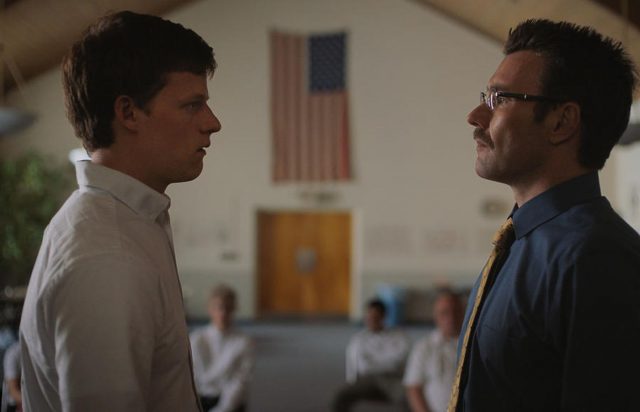Boy Erased: Thesis Statement, by David Bax
Joel Edgerton’s previous outing as director, 2015’s The Gift, was a psychological thriller that, as such movies often do, borrowed heavily from horror tropes. His new film, the real life gay conversion therapy survivor’s tale Boy Erased, sometimes flirts with doing the same, especially when it comes to Eduard Grau’s creepy score. But what Boy Erased really has in common with The Gift is that both movies are crude and mean-spirited. Boy Erased goes further by adding cynicism and smugness to the mix.
Lucas Hedges stars as Jared Eamons, a college kid in a small Southern town and son to a local preacher (Russell Crowe). When Jared confesses to his parents that he has homosexual feelings, he is enlisted in a weeks-long gay conversion program led by Reverend Victor Sykes (Joel Edgerton). Boy Erased focuses chiefly on Jared’s experience as part of the group and the events that led to his leaving “therapy” and eventually penning an exposé that shed light on a practice that has since been banned in fourteen states, the District of Columbia and numerous cities and counties across the country.
Despite his relatively brief screen time, Crowe’s soft-spoken but stern presence hangs over the entire movie. But Jared interacts most regularly with his mother (Nicole Kidman). As a character, she goes on a journey of her own alongside her son. Kidman plays it well but Edgerton gives the impression of not trusting his actress, burying her instead under big church lady wigs, heavy makeup and garish clothing that are more likely to be remembered than the solid performance beneath them.
Boy Erased is at its strongest when it’s working at the same purpose as Jared’s eventual article, surveying the inner workings of Reverend Sykes’ program. The enrollees are not (at least at Jared’s early stage) kept against their will. Instead, a mix of religious guilt and self-esteem destruction are employed to keep them loyal. When Sykes compares the souls of his charges to a dollar bill—mendable with tape and care—he’s also letting them know how much they ought to feel they’re worth at that moment. Sykes will eventually become ritually physically abusive but the early scenes of what can only be described as conditioning are somehow the most unsettling.
Perhaps if Edgerton had steered even more into his pulp impulses, though, he could have gone further and been more effective. Instead, he’s intent on reminding us at every turn that we are watching a serious movie, complete with a cold and soggy color palette that announces, “Don’t enjoy any of this!”
That’s disingenuous, though, because Boy Erased is not designed to be punishing or even uncomfortable to sit through. On the contrary, it seeks to flatter the audience at every turn, inviting you to join it in shaking your head in righteous faux-concern. The horrors of gay conversion practices have been well-documented; we don’t deserve a medal for disapproving of them. But Boy Erased is exceedingly self-satisfied about its condemnation. It’s so full of itself that it’s inert, incapable of digging beneath the surface. Edgerton has written a high school essay in which he tells you what he’s gonna tell you, he tells you and then he tells you what he told you. Garrard Conley, on whom Jared is based, deserves better than that. In fact, he already got better than that when he wrote his story himself. Go read that instead.





























This was a really obnoxious, mean-spirited, inaccurate, badly-written and unhelpful review.